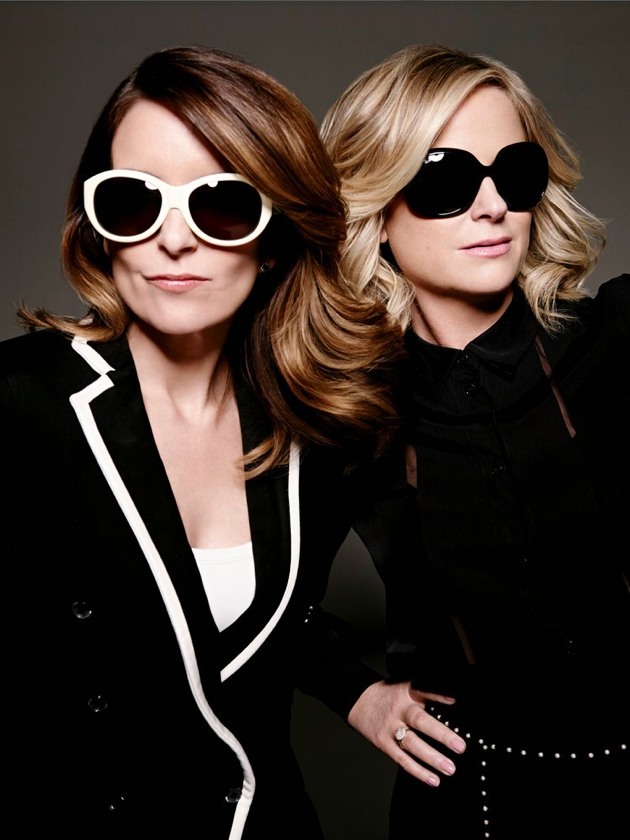
*This post of mine was also published on Forbes Woman & The Huffington Post.*
Tina Fey and Amy Poehler just may have given television its biggest feminist evening ever on Sunday. While the power partners did not disappoint, they went one step further than comedy: Fey and Poehler ushered in an evening of groundbreaking TV that feminists could cheer.
Together, the comedians took on industry double-standards, the Bill Cosby sexual assault allegations, ageism, and even exposed the sexist irony of George Clooney being awarded a Lifetime Achievement Award, pointing out that if anyone is worthy of such a prize it would be Mrs. Amal Clooney.
But Fey and Poehler did more than just make funny feminist jokes. By shining the light on widespread sexism within the industry at a traditionally sexist event, these two women changed how award ceremonies should play out altogether, as the Guardian’s Hadley Freeman explains:
Nobody goes to a movie awards ceremony in Hollywood to find a feminist statement. This is a strange pocket of the western world where it is still deemed utterly acceptable to take smart, successful women and reduce them to beauty pageant contestants, with the press holding them and inspecting their shiny hair and shiny accessories and shiny outfits as if they were My Little Pony dolls, while the men stand manfully in their backgrounds.
If there was ever a place where women are openly objectified and removed from their accomplishments it is the red carpet. We accept this to such an extent that despite ceremonies actually being about celebrating actors and actresses’ work in film and television, media coverage focuses instead on the night’s fashion.
In fact, it would be safe to say that the red carpet is a place where stars should not expect to be asked about their art at all. Everything is ultimately about appearances, and making the right best-dressed lists based on how you well you play dress-up. There is no doubt that this is a clear reflection of a much larger problem that Hollywood has with women.
Despite a study last year finding that films which pass the Bechdel Test, which rates movies’ gender biases based on select criteria, make more money than ones that do not, Hollywood remains very much a man’s world.
The Hollywood Reporter finds that regardless of the number of powerful women in film and television, we still lag “stubbornly” behind men in the entertainment industry from guild membership to pay for acting and writing. Actress and entrepreneur, Eva Longoria agrees, recognizing how women are too often type-cast:
People tend to put women in boxes: She’s sexy, she’s ambitious, she’s smart, she’s a mom…but women are complex, and we are always underestimated. There is definitely under-representation of women in film and television and I think a large part of that is they’re not behind the camera: there are not enough writers and directors and producers that are female.
Executive director of the Center for the Study of Women in Television and Film at San Diego State University, Martha Lauzen echoes Longoria’s sentiment, and says things for women are “not even close” to being a level playing field. According to her own research, women hold just 16 percent of powerful behind-the-scenes jobs such as writing, directing, and editing, down a point from a peak in 1998, over a decade ago.
Against this backdrop, this year’s show shines as an even bigger moment for women. To deliver such pro-female, feminist-centric comedy gold to Hollywood is no small feat. And after Fey and Poehler set the evening’s feminist tone, the women of Hollywood ran with it, many using their acceptance speeches to drive the point home that women matter.
The 72nd Golden Globes was a huge victory for feminists because one of Hollywood’s biggest nights became dominated by women and their stories. If the messages female audiences sent the industry with the success of Frozen, Hunger Games, Divergence, Scandal and more were not enough, 2015’s Golden Globes just set the scene for a new era in Tinseltown with a clear message that women can no longer be ignored.
We can only hope Hollywood is smart enough to finally listen to feminists.
*This post of mine was also published on Forbes Woman & The Huffington Post.
